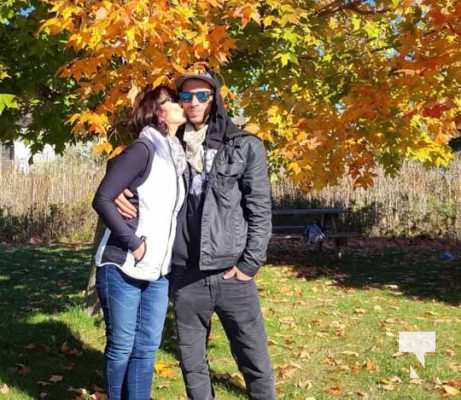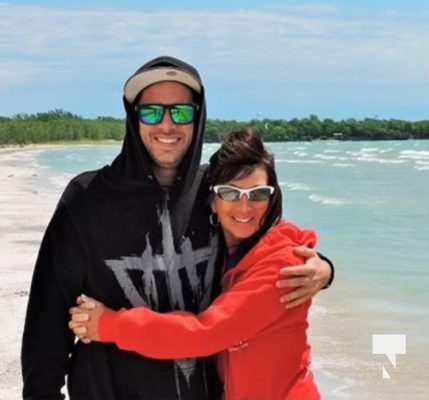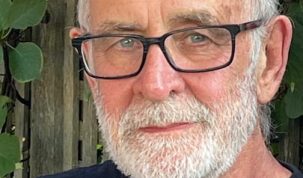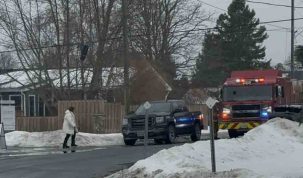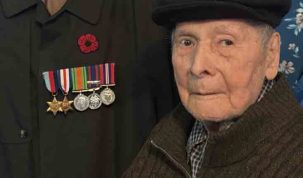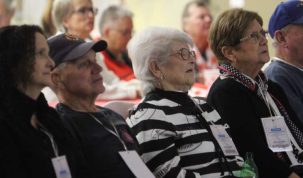Spencer Devine was 34-years-old when he took his life on September 15, 2021 by jumping from a railway bridge in downtown Port Hope.
Spencer’s mother, Liz Jeffries sat down with Today’s Northumberland and gave an exclusive interview about her son’s journey with mental health and how the system failed him time and time again.
He reached out to medical professionals including doctors and hospitals – all who dismissed him and said they couldn’t or wouldn’t help.
Spencer had been living in Alberta for eight years, but recently came back home to Port Hope in January.
His brother Chase despised flying, but for his brother, he flew out to Alberta and both Spencer and Chase drove back home to Ontario during lockdown.
In April, Spencer was a passenger in a vehicle that was involved in a serious collision and injured his knee. For the last month or so, he was living with his mother in Prince Edward County until he recovered fully.
Spencer told his mother he started taking anti-anxiety medication in January after his doctor in Alberta prescribed it. In July, Spencer contacted his doctor in Alberta – the doctor said she couldn’t write an out of province prescription and ‘strongly urged’ Spencer to find a local doctor.
When he was starting to run out of his prescription and having side effects that were affecting him physically, his mom offered to take him to a hospital in Picton where he could speak with a doctor. Hopefully to get a new medication that would help his anxiety and also not have any side effects.
Spencer sat in the waiting room for five hours. The doctor finally assessed him and told him they would only prescribe the same medication that was causing him the side effects.
“He tried finding a doctor and even when he expressed his story that he had anti-anxiety prescriptions and needed to get a re-fill no one would listen. He pleaded to speak to someone because of this side effect. They told him they weren’t taking any new patients.
Five times more it happened.
The same doctor in Port Hope turned him down twice. Doctors in Belleville and Oshawa also turned him down.
Liz was in the room when her son was calling, asking for help. She heard it first hand her son reaching out and asking for help from medical professionals.
“Even though the Oshawa Clinic promotes on their (web)site they were accepting new patients when he called, they told him that they weren’t.”
“He would explain to every office he called his situation. They knew his story and still they said they weren’t taking new patients.”
Spencer was visiting at his grandmothers house in Port Hope for the last few days of his life.
His mother visited with him on September 14. The day before he died. They spent three hours the morning of September 15 having coffee and talking. Spencer shared with his mother about a traumatic experience that happened 20 years ago.
“He buried it all those years and it resurfaced. It was consuming him. He was so upset. His mother told him there were people he could talk too and offered to go with him, he said no.
“I asked him if he was feeling suicidal?”
He said no.
Spencer’s grandmother reached out to her doctor that day to see if anything could be done to help. When she spoke to her doctor, he said that it’s not uncommon to give out of province prescriptions and for Spencer to call his Alberta doctor.
So, Spencer decided to call his doctor in Alberta again.
It was futile.
The doctor told him that she couldn’t give anymore prescriptions out of province.
Liz and Spencer talked on the phone at 11:30 am. after she’d left Port Hope.
It was just before 1 p.m. when Liz texted her son asking how his chat went with his Alberta doctor. Thirty-minutes went by and Liz thought it was “strange” that Spencer didn’t get back to her.
At approximately 2:40 p.m. Spencer took his life by jumping from the railway viaduct.
Liz thinks her son just gave up from all the closed doors to his plea and ended his life.
Spencer’s journey asking for help started at the beginning of August and ended approximately six weeks later on September 15, 2021.
Spencer had sought out help from doctors and hospitals. He reached out for help. He did what every ad, every promotion for mental health says you should do – but no medical professionals were there for him.
“How does it happen? Where do all the funds go from Bell Let’s Talk?”
“If the government is acknowledging there is an increase in mental health issues, especially during COVID, then wouldn’t they try and have resources?”
“When people are asking for help, why can’t they get it?”
“How can a doctor in good conscience say I’m not accepting any patients when Spencer was asking for help?”
It’s not a weakness to ask for help or admit you can’t cope.
Liz said Spencer was “courageous” reaching out and asking for help.
“He wasn’t shy about talking about his anxiety. He wanted people to know he was struggling and that took a lot of guts.”
“People are so ridiculously ignorant about mental health. Spencer’s death should be a wake up call for the community, doctors. offices, hospitals and the local and provincial Health Services in general.”
Spencer was well liked and loved not only by his family, but by his friends and employers.
Shortly after he came back from Alberta he sought out work and found a job in Toronto working with a large construction company as a tower rigger building high rises. The ironic part is, Spencer had a fear of heights when he first started in that profession. But soon he felt comfortable working in ‘man baskets’ suspended by tower cranes.
The company valued him and were excited to learn he’d be coming back soon. They kept telling him the job was waiting for him.
“Spencer had the ability to easily strike up a conversation and make friends. He was very social. He was generous, had a big heart and didn’t like conflict.”
Liz said her son wanted everybody to be safe, and would go out of his way to be the protector.
“He knew he was loved by us”
But his mom implores people to slow down, look out for each other during these stressful times.
“Don’t be afraid to take time and say to friends “I value our friendship .” “If somebody reaches out that you haven’t heard from in a long time, maybe there is a real good reason behind it. Everyone is so busy, take that extra moment for a picture or a coffee or a chat.”
Liz says that something has to be done with the mental health system, specifically helping people who reach out.
“Don’t just shut the door on them. You can’t just say to people, “oh sorry we’re busy, oh sorry we’re not taking any new patients.”
“If mental health is so prevalent right now, especially with all the recent lockdowns, why aren’t there resources?”
Liz said her family is extremely grateful for everyone who helped at the scene including first responders, of the emergency department of Northumberland Hills Hospital, members of Ornge air ambulance, and staff at the trauma unit at St. Michael’s hospital in Toronto.
As a parent, Liz said you don’t ever want to see your kids suffer.
“You don’t want to see your kids in pain. You just want them to go out in the world, have a good life and be happy. You watch them grow up, you go to their games, soccer, sports whatever, watch them discover their passions.”
Spencer’s passion was storm chasing and photography.
Liz cherishes the amazing photos that her son took of storms while he was working in Calgary and Toronto high above the city.
“He obviously was in pain inside and it just breaks my heart to think that for him the only way to get rid of it was this way out.”
“It makes me numb that he was in that much pain and there was no help”
“The system failed and how do we fix it?” “Whose child does it take before somebody notices something is wrong with the system?”
“More people are going to die if something isn’t done.”
Spending the last five weeks with her son was a “gift” Liz said.
But there are so many things she wishes she could do with her son just once more.
“We wanted to have another campfire – well it was too windy.”
“We wanted to go for another paddle on the water – it was too windy so we didn’t go.”
“Make time for it.”
“You know that cliche, make sure you live everyday to the fullest. Don’t put something off you can do today.”
“Well, that is now my reality.”
Liz will be second guessing herself for the rest of her life, if she did enough to help her son.
“Mental illness is not a bad word, but people just have to understand it.” “Honestly I don’t know if I understood as much as I should/could have.”
“I think about maybe if I’d stayed with him longer. “
Liz said for if you’re having a conversation with a friend or family member you feel maybe hurting, or just having a bad day – “be present.”
“If you’re doing something, just put it down. Just listen. Sometimes it’s just good to listen.”
“The person you’re talking to may not be looking for an answer.”
Today’s Northumberland reached out to Northumberland Hills Hospital on what supports are available locally.
Public Affairs with Northumberland Hills Hospital Jennifer Gillard said, below is a high level listing of some of the supports available locally, or and above one’s own primary care (family physician/nurse practitioner team):
Individuals who have access to a phone can call 905-377-7784 to receive support from the Walk-In Counsellig team on Tuesdays from 8 a.m. to 4 p.m. and Thursdays from 10 a.m. to 6 p.m. They will be asked the following – first and last name, phone number and date of birth.
Their call will be returned by Walk-In staff by the end of the business day.
Clients who do not have access to a phone, or prefer to connect directly, are welcome to stop by the Community Mental Health office, 1011 Elgin Street West, Suite 200, Cobourg, on Tuesdays and Thursdays, in the times noted above.
Outside of these hours, individuals in crises are reminded of the following resources:
Call Four County Crisis at any time at 1-705-745-6484 or 1-866-995-9933, or go to the closest Emergency Department.




